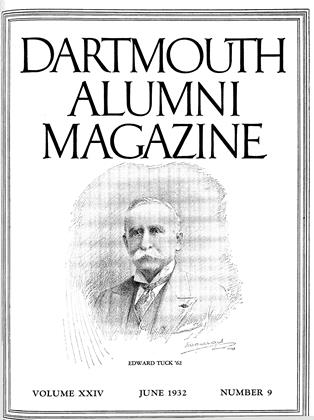According to an announcement made recently by A. B. Crawford, director of the department of Personnel Study at Yale, and president of the Eastern College Personnel Officers Association, the placement and personnel officers of many of the eastern colleges have determined to exert every effort to curb the long prevalent practice of door-to-door salesmen who trade upon their college connections in order to effect sales.
After an intensive survey of the experiences of college men who accepted sales jobs during the summer of 1931, representatives of Amherst, Bates, Boston University, Bowdoin, Brown, Columbia, Connecticut College, Cornell, Dartmouth, Harvard, Massachusetts Institute of Technology, Massachusetts State College, Middlebury, Mount Holyoke, New York University, Pembroke, Princeton, Radcliffe, Russell Sage, Rutgers, Vassar, Wellesley, Wesleyan, Wheaton, Williams, Worcester Polytechnic and Yale have issued the following statement through Mr. Crawford:
"It is our belief that no student has a right to trade upon his educational status in selling goods. We believe that products should be sold entirely upon their merits and that prospective buyers should have the privilege of accepting or rejecting such products upon the basis of their excellence rather than upon an emotional appeal which has nothing whatever to do with the case. We have found that many customers in the past have given orders to canvassers, merely in order to help the salesmen secure credits or commissions which were alleged to assist them in earning their college We believe that solicitation of this nature in effect amounts to begging, is definitely harmful to the college student's moral sense and reflects unfavorably upon colleges and their students as a group. The policy of certain companies to offer so-called 'scholarships'—which are in reality merely sales bonuses thinly disguised and in no way related to the student's scholastic record, is another common means of misrepresentation employed to stimulate orders.
"We have also found that the constant use of the sympathy appeal has tempted many non-college men to misrepresent themselves as students. We believe that the resentment shown by buyers, who have purchased goods from a supposed college man and have later discovered that he was not an accredited student, indicates that the public is as eager as the colleges to correct this long standing abus?.
"For these reasons, we shall urge all students in our respective colleges and universities not to employ the sympathy appeal in the future or otherwise to trade deliberately upon their student status in any way, as a means of self-support. Companies hiring students through college placement offices will be asked to delete from their sales talks, all references to the educational connections of their college salesmen.
"We request all persons who are approached by salesmen using the college student appeal to secure the name of the salesman, the college of which he claims to be a member, and the company for which he is working. We urge all persons who are so approached by a salesman, representing himself as a student in any of the institutions listed above, to communicate with the director of student employment in that college or university, giving such information as has been obtained.
"By thus urging college students to sell goods solely on their merits, and by securing from the public information about non- college salesmen who pose as college students in order to effect sales, we hope to eliminate many of the evils which have crept into summer canvassing procedure. Co-operation with the colleges along the lines suggested will curb the practices prevalent among door-to- door salesmen who attempt to trade upon their real or alleged college connections. By these means also, we hope that the public will be more effectively protected from imposters and students from unscrupulous sales managers; and that the resulting influence of summer sales work will become beneficial, financially and otherwise, to students, rather than harmful, as has so often proved to be the case in recent years."
TUCK DRIVE Built with funds provided by Edward Tuck, the Drive is a beauty spot of Hanover
 View Full Issue
View Full Issue
More From This Issue
-
 Article
ArticleEdward Tuck: A Biographical Sketch
June 1932 By Horatio S. Krans -
 Article
ArticleDartmouth's Greatest Benefactor
June 1932 By Russell R. Larmon -
 Class Notes
Class NotesCLASS OF 1910
June 1932 By Harold P. Hinman -
 Class Notes
Class NotesCLASS OF 1926
June 1932 By J. Branton Wallace -
 Sports
SportsIron Man
June 1932 -
 Class Notes
Class NotesCLASS OF 1905
June 1932 By Arthur E. McClary
Article
-
 Article
ArticleGRIDIRON GROPINGS
November 1935 -
 Article
ArticleMorse Code Practice
August 1942 -
 Article
ArticleAlumni Register
April 1951 -
 Article
ArticleGreen Gift-Book Ideas
DECEMBER 1996 -
 Article
ArticleHanover Browsing
October 1938 By HERBERT F. WEST '22 -
 Article
ArticleTHE CLAIM OF THE NEEDY STUDENT
December, 1910 By Morton Chase Tuttle '97


